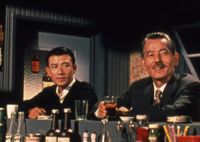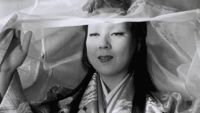TIFF CINEMATHEQUE Presents - SUMMER IN JAPAN
TIFF Cinematheque presents every year summer classics films from different countries like France and Italy are screened. This year it is Japan.
The programme is an essential primer on the country’s cinema, featuring 30 works from some of its most celebrated auteurs, as well as a selection of titles by rarely-screened Japanese masters. The programme runs from July 5 – September 1, 2018 at the TIFF Bell Lightbox
From samurai epics to intimate family dramas and every genre in between, this vast survey includes not only some of the best-known titles by the five most celebrated Japanese auteurs — Mizoguchi, Ozu, Kurosawa, Ichikawa, and Naruse — but also the stars of the Japanese New Wave, as well as rarely-screened yet immensely gifted directors.
Curated by TIFF Cinematheque Senior Programmer James Quandt, and co-presented by The Japan Foundation, this cinematic omakase features 16 titles in 35mm, two digital restorations, and several introductions by guest speakers.
AN ACTOR’S REVENGE (Japan 1963) ***
Directed by Kon Ichikawa

AN ACTOR’S REVENGE is exactly what it is - the film is fully about an actor’s revenge. When performing on stage, an actor, famous from his Osaka Performing Troupe, recognizes his eternal enemy who is watching him perform. The Lord has made love to his mother causing her to take her life. He wants to have him, his daughter and associate done away with. Distraction occur when a pickpocket thief, a really beauty falls for this actor. The actor in question is a male in drag, since the role he plays on stage is that of a female. But he is skilled in swordplay and he encounters a past student who becomes his help. All this looks strange but somehow wonderful, as the audience witnesses the events leading the revenge, including a beautiful femme fatal who falls for him. A lot of the fights are occur in the dark of night, and the resulting filming of the action scenes are magnificently shot with very effective use of lighting and editing.
Trailer: https://www.youtube.com/watch?v=jQyCnC8tkSc
AN AUTUMN AFTERNOON (秋刀魚の味) (JAPAN 1962) ****
Directed by Yasujirō Ozu.

Ozu’s final film which many consider a masterpiece. Ozu regular Chishū Ryū plays the patriarch of the Hirayama family consisting of a daughter, Michiko (Shima Iwashita) and two sons, one married and one still living at home with the father and unmarried sister. He is comfortable with his unmarried daughter, Muchiko cooking and looking after him but eventually realizes that he has a duty to arrange a marriage for her. It was Ozu's last film; he died the following year on the day he turned 60. Ozu’s films often feels stage-like with his actors moving in and out of his frames. Closeups are rare. But this is Ozu’s style and one expects this from his films Still Ozu is a Master story-teller, and in AN AUTUMN AFTERNOON, his beautifully crafted observational piece, captures the life of the patriarch, even right through World War II whence served as Captain in the Japanese Navy. The films show how true happiness can be achieved with kindness, humanity and simplicity.
Trailer: https://www.youtube.com/watch?v=Wq0XhT1SRho
THE BALLAD OF NARAYAMA (Japan 1958)***1/2
Directed by Keisuke Kinoshita

Narayama-bushi Kō is a 1958 Japanese period film directed by Keisuke Kinoshita and based on the 1956 novella of the same name by Shichirō Fukazawa. The film explores the legendary practice of obasute, in which elderly people were carried to a mountain and abandoned to die. The subject of the film is the grandmother Orin, reaching her ripeful age to make the final journey to Narayama before her death. She lives with her son, another son and daughter-in-law in a poor village where she cooks and tends for them. As she prepares for obasute, several events happen including the arrival of a new bride for the widowed son, theft in the village and neighbour problems. Director Kinoshita immerses his audience right into the action from start to finish. The events of the story are punctuation by Japanese rhythmic folk songs. The film has a surreal look as Kinoshita shoots the action amidst bright colours that include made-up sets and artificial vegetation.
Trailer: https://www.youtube.com/watch?v=Lw08P2VDdgM
RASHOMON (Japan 1950 ***
Directed by Akira Kurosawa

A man and his beautiful bride travel along dangerous and lonely roads. They are robbed by a bandit played by Kuroswa’s regular, Toshiro Mifune and the wife apparently raped. Having being had by two men, the wife is either: spurned by the two men or seduced by the robber and leaves the husband. Different versions of the tale (the most horrible of all time, the audience is warned) are revealed in flashbacks as recounted by different witnesses, including a dead spirit. Audiences will be a bit rattled to find out that what is seen in flashback might not really be true. Hitchcock did the same with a false flashback in STAGE FRGHT that audiences never forgave him for. The only truth is the man being murdered. RASHOMON, shot in black and white has stunning photography from the pouring rain at RASHOMON, the name of the gate where three men recall their stories to the bright sun shining though the forest trees as the camera is turned towards the sky. RASHOMON is supposedly Kurosawa’s best piece alongside THRONE OF BLOOD.
Trailer: https://www.youtube.com/watch?v=xCZ9TguVOIA
UGETSU (Japan 1953) ****
Directed by Kenji Mizoguchi

A historical period classic on how greed, pride and temptation destroy men. Shot in crisp black and white, UETSU has been widely regarded as one of the greatest films in the history of cinema, director Mizoguchi’s unforgettable fable taking place in 17th-century Japan where people are poor and suffer under the tyranny of warlords and their soldiers. The subjects are two villages men — a peasant who yearns to become a samurai and a potter who would stop at nothing, including risking in life to gain fortune from selling his wares. Their poor long-suffering wives grumble but are unable to change their husbands’ ways. A supernatural element is added into the story when the potter is seduced by an exquisitely beautiful woman who turns out to be a phantom. UGETSU is gripping from start to finish with the audience always rooting for the poor men but alas! They get war they deserve!



Comments powered by CComment